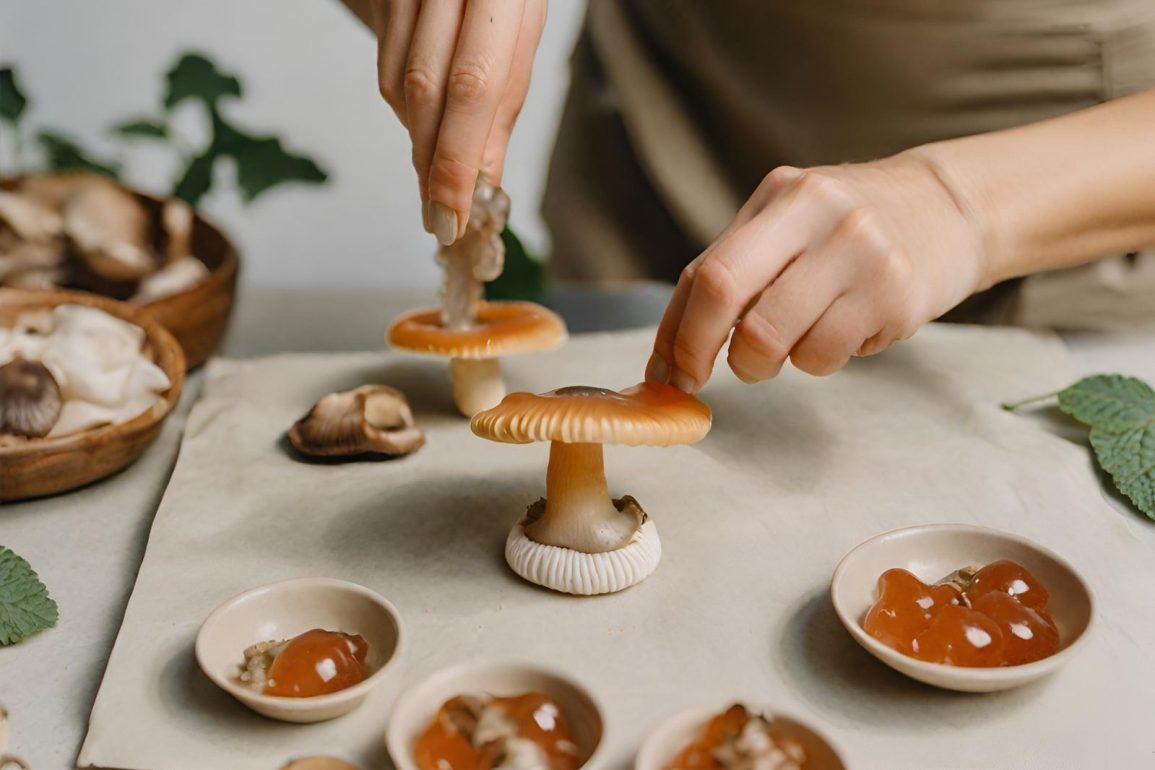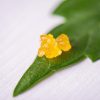Magic mushroom gummies have been gaining popularity as a fun and convenient way to incorporate the potential benefits of medicinal mushrooms into your daily routine. You may get information about how to make mushroom gummies.
Table of Contents:
- What are Mushroom Gummies?
- Why Mushroom Gummies?
- Customize Your Mushroom Gummies
- Is it Okay to Heat My Mushrooms?
- The Cooking Process
- Nutritional Impact
- Cooking Methods Matter
- Mushroom Gummy Recipe
What are Mushroom Gummies?
These chewable treats combine the earthy goodness of mushrooms with the sweetness of gummy candy, making them an enjoyable and accessible option for those interested in exploring the world of mycology.
Understanding Medicinal Mushrooms
Medicinal mushrooms have a rich history of use in traditional medicine systems around the world. While there are countless mushroom species, a few have garnered significant attention for their potential health benefits. Some of the most well-known medicinal mushrooms include:
- Reishi (Ganoderma lucidum): Known as the “Mushroom of Immortality,” reishi is believed to support the immune system and promote relaxation.
- Lion’s Mane (Hericium erinaceus): This mushroom is associated with cognitive health and may support memory and focus.
- Chaga (Inonotus obliquus): Chaga is rich in antioxidants and is often used for its potential immune-boosting properties.
- Cordyceps (Cordyceps militaris): Cordyceps may help increase energy levels and endurance, making it a favorite among athletes.
Why Mushroom Gummies?
While some people enjoy consuming mushrooms in their natural form, others may find their taste and texture unappealing. Mushroom gummies offer a tasty alternative that makes it easier to incorporate these potentially beneficial fungi into your daily routine. Here’s how you can make mushroom gummies recipe at home:
Ingredients You’ll Need:
- Medicinal mushroom extract or powder (e.g., reishi, lion’s mane, chaga, cordyceps)
- Gummy molds
- Gelatin (for a traditional gummy texture) or agar-agar (for a vegan option)
- Fruit juice or flavored water
- Honey or another sweetener (adjust to taste)
Step-by-Step Instructions:
1. Prepare Your Ingredients:
Gather your chosen medicinal mushroom extract or powder, gummy molds, and the base liquid (fruit juice or flavored water). You’ll also need either gelatin or agar-agar as a gelling agent. Gelatin provides a more traditional gummy texture, while agar-agar is a vegan-friendly alternative.
2. Mix the Base Liquid:
In a saucepan, warm the base liquid over low heat. Add honey or your preferred sweetener to taste. Stir until the sweetener is completely dissolved.
3. Add Mushroom Extract or Powder:
Once the base liquid is warm (not boiling), add the medicinal mushroom extract or powder. Stir thoroughly to ensure it’s well incorporated. Adjust the quantity based on your desired potency, but be cautious not to use too much, as some mushroom extracts can have a strong, bitter taste.
4. Introduce the Gelling Agent:
If you’re using gelatin, sprinkle it evenly over the liquid and stir continuously until it’s completely dissolved. For agar-agar, follow the instructions on the package for the right quantity to use. Typically, you’ll need less agar-agar than gelatin.
5. Pour into Gummy Molds:
Carefully pour the mixture into gummy molds. Silicone molds work well and make it easy to pop out the gummies once they’re set.
6. Allow to Set:
Place the filled molds in the refrigerator and let them set for several hours or overnight. Gelatin-based gummies will firm up faster than agar-agar ones.
7. Enjoy Your Mushroom Gummies:
Once the gummies are fully set, remove them from the molds, and they’re ready to enjoy. Store any extra gummies in an airtight container in the refrigerator to preserve freshness.
Customize Your Mushroom Gummies
The beauty of making mushroom gummies at home is the ability to customize them to your preferences. You can experiment with different mushroom varieties, adjust the sweetness level, or even mix in other beneficial ingredients like vitamin C for an added immune boost.
Remember that while mushroom gummies can be a tasty and enjoyable way to consume medicinal mushrooms, they should not be viewed as a replacement for professional medical advice or treatment. If you have specific health concerns or are considering incorporating medicinal mushrooms into your wellness routine, consult with a healthcare professional or a qualified herbalist for guidance on the most suitable mushroom varieties and dosages for your needs.
Is it Okay to Heat My Mushrooms?
Mushrooms, those delightful fungi that add a savory and earthy flavor to various dishes, have been a staple in cuisines worldwide for centuries. While they are commonly enjoyed sautéed, roasted, or grilled, a question often arises: is it okay to eat mushrooms? Do they lose their nutritional value or unique properties when exposed to heat? In this blog, we’ll delve into this culinary query and explore the science behind cooking mushrooms.
The Cooking Process
Mushrooms, like most vegetables, undergo transformations when exposed to heat. These changes occur due to the application of heat, which initiates several processes:
1. Water Evaporation: As mushrooms heat up, the water content within them begins to evaporate. This process leads to a reduction in size and volume, resulting in a more concentrated flavor.
2. Caramelization: The natural sugars present in mushrooms undergo caramelization, imparting a sweet and complex flavor to the fungi. This caramelization process is responsible for the browned edges and enhanced taste of sautéed mushrooms.
3. Maillard Reaction: When amino acids and reducing sugars in mushrooms react under high heat, the Maillard reaction occurs. This reaction results in the formation of new compounds that contribute to the delicious umami flavor that mushrooms are known for.
Nutritional Impact
While cooking mushrooms leads to flavor enhancements, it also affects their nutritional content. Here’s a breakdown of how heating mushrooms can impact their nutritional value:
1. Increased Nutrient Availability: Cooking mushrooms can break down their cell walls, making the nutrients more accessible to your digestive system. For example, heated mushrooms release more antioxidants and nutrients like ergosterol (a precursor to vitamin D) compared to raw mushrooms.
2. Enhanced Protein Digestibility: Heat helps in breaking down the proteins in mushrooms, making them easier to digest and absorb. This can be especially beneficial for individuals seeking plant-based protein sources.
3. Reduced Vitamin Content: On the downside, some heat-sensitive vitamins, such as vitamin C and some B vitamins, may degrade during the cooking process. However, the overall impact on mushroom nutrition is relatively modest, and the benefits of cooking mushrooms often outweigh these minor losses.
Cooking Methods Matter
The impact of heat on mushrooms varies depending on the cooking method. Here’s how different cooking methods affect mushrooms:
1. Sautéing: Sautéing mushrooms at medium-high heat can create a rich, caramelized flavor while preserving their nutrients. It’s a popular method for enhancing the taste of mushrooms.
2. Roasting: Roasting mushrooms in the oven at a high temperature (around 400°F or 200°C) can yield flavorful and slightly crispy results. Roasted mushrooms make for a delectable side dish or addition to salads.
3. Grilling: Grilled mushrooms develop a smoky and charred flavor, making them a favorite for outdoor barbecues. Grilled mushrooms are often marinated to enhance their taste further.
4. Boiling: Boiling mushrooms may lead to a significant loss of water-soluble nutrients, so it’s generally not recommended unless you plan to consume the cooking liquid as well, such as in soups and broths.
In summary, it is absolutely okay to heat your mushrooms, and in many cases, it’s encouraged. Cooking mushrooms not only enhances their flavor but also makes their nutrients more accessible and digestible. While some heat-sensitive vitamins may experience minor degradation, the overall nutritional impact is relatively small compared to the culinary benefits.
Mushroom Gummy Recipe
Now that we’ve established that cooking mushrooms is not only okay but also delicious let’s explore a unique and delightful recipe: Mushroom Gummies.
Ingredients:
- 1 cup of your favorite mushrooms (e.g., cremini, shiitake, or oyster)
- 1 cup of water or mushroom broth
- 2 tablespoons of agar-agar powder (a vegan gelling agent)
- Optional: Seasonings like garlic powder, thyme, or a pinch of salt
Instructions:
- Prepare the Mushrooms: Wash and finely chop your choice of mushrooms.
- Cook the Mushrooms: In a saucepan, sauté the mushrooms until they release their moisture and turn golden brown. This enhances their flavor.
- Make Mushroom Broth: If you’re not using mushroom broth, add 1 cup of water to the sautéed mushrooms and simmer for about 15 minutes to create a flavorful mushroom broth. Season with optional seasonings as desired.
- Strain the Broth: Strain the mushroom broth to remove any solids.
- Gel the Broth: Return the mushroom broth to the saucepan and sprinkle agar-agar powder over it. Stir continuously over medium heat until the agar-agar is fully dissolved. This will create a gel-like mixture.
- Pour into Molds: Pour the hot mushroom gel into gummy molds or a silicone ice cube tray.
- Cool and Set: Allow the gummies to cool and set in the refrigerator for a few hours or overnight.
- Enjoy: Once the gummies have set, pop them out of the molds and enjoy your savory mushroom gummies.
These mushroom gummies offer a unique and savory twist on the traditional sweet gummy candies. They are a fun and delicious way to incorporate the flavors and potential health benefits of mushrooms into your diet.
In conclusion, heating mushrooms is not only acceptable but also highly recommended to enhance their flavor and make their nutrients more accessible. So, feel free to explore various cooking methods and enjoy the culinary delights that mushrooms have to offer, whether you prefer them sautéed, roasted, or even in the form of savory mushroom gummies.
Disclaimer – The contents of this article are provided solely for informational purposes and should not be considered medical advice. It is important to note that the information presented here is not meant to diagnose, treat, cure, or prevent any disease. Prior to embarking on any new health-related regimen, Always consult your healthcare provider before trying new supplements or treatments. Keeping you safe and well is our top priority. Additionally, it’s important to note that the FDA has not endorsed any claims regarding the health benefits of cannabis. Delta8Hub makes no guarantees or warranties regarding the accuracy, completeness, or usefulness of any messages contained here in.

